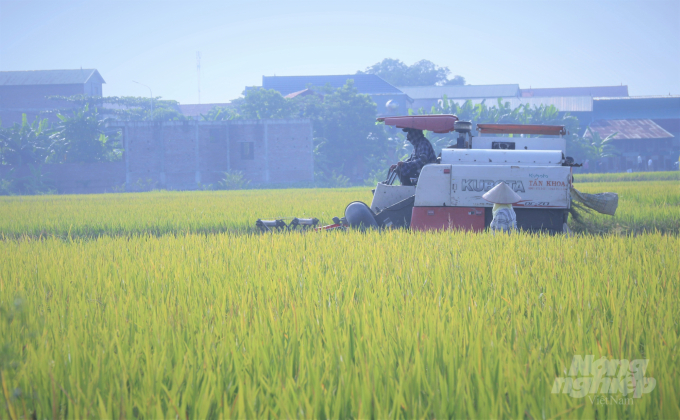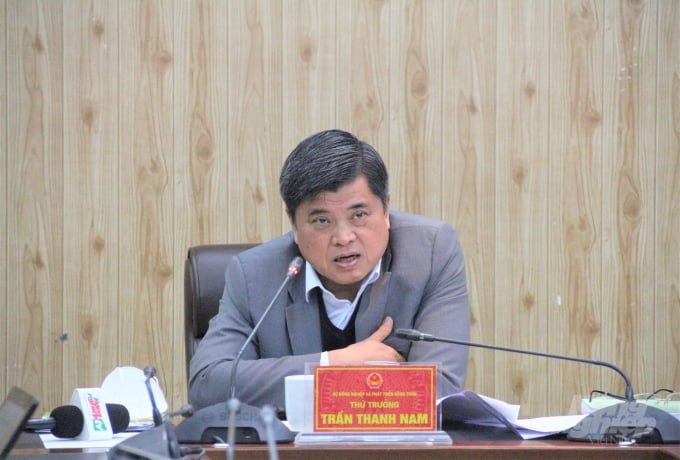November 27, 2025 | 14:15 GMT +7
November 27, 2025 | 14:15 GMT +7
Hotline: 0913.378.918
November 27, 2025 | 14:15 GMT +7
Hotline: 0913.378.918
Throughout the Conference on Policy Consultation on Agriculture - Countryside - Farmers taking place on February 22, the presentations, opinions and views have opened up a lot of matters in order to be able to issue a new Resolution in the field of agriculture - countryside - farmers to replace Resolution No. 26-NQ/TW.

For Vietnam's agriculture to continue its sustainable development in the future, the existence of new policies and institutions in agriculture is deemed extremely urgent. Photo: Pham Hieu.
Taking advantage of natural advantages, for more than 30 years of innovation, Vietnam's agriculture has always maintained an average growth rate of about 3.5%/year, high in Asia in general and in Southeast Asia in particular. However, from 2020 to now, the agriculture sector has faced many difficulties.
Many agro-products in Vietnam still rely on simple labor. The production scale is small, and the comparative advantage is low. The majority of products are exported in raw form, resulting in low added value and gained benefits.
Vietnam is located at a geographical position that heavily suffered from natural disasters, epidemics, climate change and sea level rise. The development of agricultural production therefore contains many unsustainable factors. This has negatively affected the productivity and output of some of Vietnam’s key agro-products such as rice, fruit, coffee, pepper, and rubber.
According to Dr. Nguyen Anh Tru, Faculty of Accounting and Business Administration, Vietnam National University of Agriculture, in order for Vietnam's agriculture to continue its sustainable development in the future, the existence of new policies and institutions in agriculture is deemed extremely urgent.
To be more specific, it is essential to have policies that support planning and management of agricultural land use in order to protect the benefits farmers; apply science and technology in agriculture and develop the agro-product processing industry; attract foreign direct investment (FDI) for agricultural development; restructure agricultural economic towards sustainability; improve productivity, quality and efficiency of agroproduction towards sustainability; develop agriculture comprehensively associated with social justice, hunger eradication and poverty reduction, improve people's living standards; ensure that agricultural growth goes in line with sustainable environmental protection; help laborers improve professional qualifications and market understanding.
According to Deputy Minister of Agriculture and Rural Development Tran Thanh Nam, continuing to restructure the agricultural sector towards enhancing added value and sustainable development is the right step to take.
Policies in agriculture up to now have mainly been about research and technology transfer for agriculture and also on seed development. However, direct policies to support agroproduction and agricultural economic development are still lacking and require further studies.

Direct policies to support agroproduction and agricultural economic development are still lacking and require further studies. Photo: Pham Hieu.
Deputy Minister Tran Thanh Nam stated the agricultural sector currently has two problems that need special attention. The first problem is the reorganization of production according to the agro-product value chain. The second problem is that in order to ensure industry linkages, the key point is to build raw material areas.
Reality has shown that processing factories are very large in number and can operate continuously but the story of raw materials is the complete opposite.
“The problem here is to build large-scale material areas that meet standards and is high in quality and productivity. I agree with the opinions that have been raised in the conference: It is necessary to research and come up with policies to expand production and transfer agricultural land use rights, thereby making it possible to complete and build large fields and raw material areas", said Deputy Minister Tran Thanh Nam.
Through directing the implementation of the National Target Program on New Rural Development, Deputy Minister Tran Thanh Nam added that there are also many problems in rural areas at present specifically agroproduction management at commune and district levels. Having mechanisms and policies to effectively manage and invest is a matter of great concern.
“Urban management has its own separate Decree, but when it comes to rural areas there is only the New Rural Construction Program. While the program is only about construction, a clear legal mechanism is needed to manage new rural projects," said Deputy Minister Tran Thanh Nam.
Translated by Samuel Pham

(VAN) After the institutional merger, Da Nang possesses significant forest-carbon reserves and is proactively engaging in the carbon market, creating a new revenue stream.

(VAN) An Giang strengthens communication against IUU fishing, increases inspections and sanctions, and is determined to remove the EC’s “yellow card” while developing a sustainable fisheries sector.

(VAN) As green transition becomes a global trajectory, Viet Nam’s biggest challenge is not only technology and models, but how to ensure that capital flows reach the right beneficiaries.

(VAN) The Ministry of Agriculture and Environment must spearhead the construction of green governance, spanning decision-making processes and investment standards to policy evaluation mechanisms.

(VAN) The Agriculture and Environment sector of Khanh Hoa has achieved numerous milestones over the past 80 years, contributing significantly to the goal of establishing the province as a centrally governed city by 2030.

(VAN) Viet Nam is entering the pivotal period of 2025-2030, moving toward the formulation of the Remote Sensing Law, which will establish a legal foundation for the development of national digital data.

(VAN) The agricultural sector is finalizing the strategic framework for emission reduction, setting the goal of sharply cutting methane and 403.7 million tons of CO2 equivalent and moving toward Net Zero by 2050.